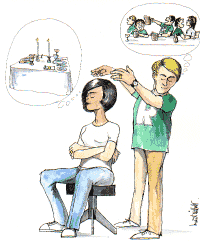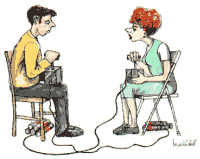DON'T TAKE YOUR PARTNER FOR GRANTED.
Think about this question for a moment. Are you as polite, kind and considerate to your partner as you are to a casual acquaintance? For most of us, the answer is no. How come? How is it that this same person that you now hardly give a moment's thought to, unless it's negative, could be the same one to whom you once were so loving, giving and appreciative?
Let's face it. We're all guilty of amnesia. After a time, we just seem to forget about all those small and large kindnesses that our partners do for us. Or, if we don't forget, we just come to expect that it's part of our partner's job description. When a relationship reaches the point at which amnesia or expectation replaces appreciation, then trouble is close at hand.
EXERCISE:
You can change that. You can start by not assuming that those things that your partner does for you are obligatory. In fact, I would suggest you take a piece of paper and write down those things that your partner does for you - both large and small. Then honestly ask yourself, among those things that your partner does for you, do you ever show appreciation and in what manner do you express it? Most likely, you'll discover that for many of the kindnesses on the list you've probably never said "Thank you. I really appreciate you for..." So if you would like to breathe some life into your relationship, let me suggest the following. Try committing yourself to a week of thank you's and notice the change.
DON'T MIND-READ
Don't assume that you know what your partner is thinking and feeling. There's a good chance you could be wrong, and wrong assumptions cause unnecessary conflict.
Imagine this situation. You walk into the living room and there's your husband sitting on his favorite chair glaring at the wall. His lips are tight; his jaw is clenched. Your immediate reaction: fear. "What did I do? Why is he so angry at me?" You tentatively approach him, "What's the matter, Bill?" you ask, expecting him to pour his wrath upon you. Bill slowly turns toward you. The tense, angry look begins to melt and he says sadly, "I've been laid off."
"Thank God," you almost blurt out, "at least it wasn't me."
In this case, the woman checked out her assumptions and found out that her husband wasn't upset with her. Yet how often does it happen that we make the wrong assumptions and just go on believing them without ever discovering if they're true?
It often happens during the process of marital therapy that assumptions, illusions and fantasies are exposed as false or only partially true. For example, the angry, critical husband who supposedly hates his wife might in fact be an insecure man who is convinced that his wife doesn't love him. Perhaps, as in one case that I know of, a distant, rejecting wife turned out to be a very sad woman, mourning the loss of her mother. So, to quote my former basic training drill sergeant, "Assumptions are the mother of all f-ups." Don't assume. Check it out.
EXERCISE:
Take a piece of paper and without thinking too much about it, complete the following sentence: "I assume that my partner thinks or feels.... about me." After you compile your list, try checking out some of these assumptions.
DON'T BLAME.
How easy it is to say, "It's your fault. You made me do it. It's because of you that things are so bad between us. You're the reason I feel so miserable." It's so hard to look at ourselves and ask, "What's my part in creating the difficulties between us?" The problem with blaming is that it never solves anything and it nearly always triggers a negative reaction.
When each of us blames, we deny our partner the opportunity to think seriously about our words and to respond in a thoughtful manner. In addition, anyone who feels blamed usually responds in kind. The result is either a skirmish or all out war. Your partner is now your enemy who you must disarm or even destroy at all costs. All is fair in love and war-- and marriage is both.
So what's the antidote to blaming? The answer is simple: Take responsibility for yourself. Putting it into practice is a challenge. It's hard to give up that feeling of being right. It's so difficult to let go of that need to force a confession out of our partners. I'll let you in on a marital truth: Being "right" in a relationship is the booby prize. You win; the relationship loses. Don't you want the relationship to win? You'll win, too. Try looking hard at what your part is in creating the conflict. Ask yourself, "What am I doing to create distance and hurt?" If you're not sure, let me help you out. Most likely you are blaming.
EXERCISE:
Try the following exercise to help you make the switch from blaming to taking responsibility for your behavior. First, write a list of all the ways you blame your spouse. For example, "It's because of you that the house is a mess," or "You're the reason Bobby is running around with a bad crowd. It's because you never spend anytime with him." Second, take a good hard look at yourself and record what you're responsible for. Third, look for solutions in each of these situations. In the last example, she might consider telling her husband, "I'm worried that Bobby's running around with a bad crowd. I'd like to talk about what we can do about it." She might be pleasantly surprised to discover that when approached respectfully, her husband, on his own, will realize that he needs to spend more time with his son.
DON'T PLAY SHRINK.
In other words, "Don't interpret!" Don't assume you understand your partner's deepest motivations and the subtlest nuances of his behavior. You may think you're objective, but let me tell you, nobody who is deeply involved in a relationship can maintain professional distance. More often than not, interpretations don't come from a place of selfless concern and a desire to help. Rather, if we're honest with ourselves, we'd recognize that these so-called truthful statements about our spouse are just disguised resentments, cloaked in a garment of objective concern.
Perhaps, you're like me. I don't want my wife to interpret what I think and feel. I want her to listen. I want her to hear. I want her to respond as a friend, as someone who is concerned about me. There are two antidotes to interpretations: The first is to be clear about our resentments and not to express them covertly through our analysis of our partner's behavior. The second is to listen in an open, loving manner.
EXERCISE:
Try the following exercise: The next time your partner talks to you, work extra hard at trying to understand her. Practice active listening by non-verbally indicating that you're hearing him. You can do this by maintaining eye contact and holding your partner's hand or embracing her in a caring, non-sexual manner. Periodically, respond with supportive statements that acknowledge how your partner feels. An example might be, "I understand how angry you are at your boss. If I were you, I'd sure be furious."
DON'T SAY YES WHEN YOU MEAN NO.
We're often afraid to say no to our partners. Perhaps, you're scared that he'll become angry, or, maybe, if you were to say "I'm sorry, I just don't want to do that," she'd be disappointed and you'd start feeling guilty. So, instead of asserting ourselves and saying what we want, we end up doing the opposite and often feel resentful. The problem with saying yes when we mean no is that we stop being real in the relationship. There's no intimacy in a relationship without honesty.
It may be that when you start to say no when you mean no, you'll say yes when you mean yes. Your honesty might increase the trust in your relationship. More likely, however, the change in your behavior will at first be threatening to your partner. Remember he's not used to you being so honest. She might be painfully surprised to learn that not all of your yes's were indeed yes's.
It's important to know that anytime you change the rules in a relationship there's bound to be conflict. That's okay. Conflict is often necessary for a relationship to grow. Through conflict two people can create a deeper understanding of one another and develop a stronger bond.
If you already have a strong connection with your spouse, then your commitment to honesty will only deepen that relationship. If you don't, I recommend you proceed carefully. Before you start being totally honest, try assessing what your partner's reaction will be. Perhaps the most effective way of asserting yourself is to speak to your partner about how you feel and insist that the two of you get professional help. The process of reaching a deeper level of honesty is often bumpy, but once you arrive, it's well worth it.
EXERCISE:
Try the following exercise: 1. Write the following on a piece of paper: "I'm afraid to tell my partner...." 2. Prioritize the list, one being the easiest of your truths to reveal, two, the second easiest and so on. 3. Imagine approaching your partner and telling him or her the truth. Notice how you feel as you do that. Try breathing easily and gently tell yourself to relax. 4. When you're able to visualize speaking to your partner, then take the risk of doing it in reality. Start with the easiest (1) and go down your list.
DON'T USE SILENCE AS A WEAPON.
Silence is a deadly weapon. It's easier to deal with a non-violent, verbal fight where at least you get out what's bothering you than an icy silence where all you can do is imagine how many different ways your partner hates you. So, if you don't want to kill your relationship, then you need to learn how to express resentments in a way that can be heard, acknowledged and resolved. That skill is of utmost importance in a relationship; without it, small problems become major catastrophes.
So, how do you learn to say all those things that are so hard to say? And, how do you say them to a partner who may tell you to go take a flying leap? Granted, it's not easy but making a relationship work never is. Try the following and get back to us and tell us what happened.
EXERCISE:
1. Write a list of your resentments in the following way: "I resent you for x." 2. Write a letter to your partner about what's bothering you. Don't blame. Try to start from a positive, loving place. An example might be: "Dear Bill, I feel a real need to talk about us. I love you and want our marriage to work. What I'm about to tell you might hurt you. It's not my intention. What I want is for us to be close. But there are things I want to get off my chest. Please think about what I'm writing and try hard not to react with anger. This is hard for me but here goes: I am upset with....." Don't dump the kitchen sink on your partner. Mention a few of the most important things that are bothering you. If you are aware of what your part is in creating problems, mention it. Your partner will be much more open to looking at his part if he feels you're doing the same.
DON'T ACT OUT.
What does it mean to act out? Acting out is indirectly expressing feelings and emotions through behavior. For example, a teenage girl might act out sexually as a way of expressing her anger toward her parents. She's unable to relate directly to them and say what's really bothering her so she uses attention getting behaviors which alarm and infuriate the parents. This is an awkward and indirect way of establishing a relationship. It's often done unconsciously and it frequently occurs in marriage.
People act out by having affairs, by making messes, by withdrawing, by becoming depressed, and even by suicide. They can act out by being irresponsible with money. There is no end to the ways that we have of saying, "I'm really angry at you."
So what is the antidote to this? Direct communication - learning how to tell your partner what's really on your mind. With acting out you never get to the source of the problem. You only harm yourself and each other.
EXERCISE:
1. Find a quiet, comfortable place where you will not be disturbed for 30 minutes. 2. Close your eyes and breathe easily and effortlessly. Stay focused on your breathing. In a relaxed manner observe your breath as you inhale and exhale. 3. After a few minutes ask yourself the following question: "What is it that I do that bothers my partner?" For example, it might be the mess you leave; the way you spend money, or your lateness. Be honest with yourself. 4. After you've become aware of these behaviors write them down. If you're aware that these behaviors upset your partner, then ask yourself "Do you wish to continue to use these methods to aggravate your partner?" If the answer is "No," then ask yourself, "What purpose do these behaviors serve and what would be a more effective way of communicating the feelings that these behaviors are expressing? 5. Be aware that this process might uncover some deep hurts and resentments. Remember dealing with the truth is ultimately the only way to heal your relationship. Be careful not to dump all of your negative feelings on your partner at once. Think about how and when to begin to share your feelings.
DON'T THREATEN
All is fair in love and war and marriage is no exception. Let's not kid ourselves. Even the most loving relationship can degenerate into a vicious struggle between bitter enemies. In this dangerous marital game nothing is sweeter than getting even and the only thing that matters is winning. Verbal and physical threats and abuse become the weapons of marital discord.
The only advice you can give to a couple who are engaged in such a struggle is: "Immediately seek help or get out." Thankfully, most of us are not contestants in such a fierce and destructive battle. More than that, I'm assuming that each of you wants to learn how to create a peaceful and loving relationship. If so, let me be bold enough to make a stern warning. Never threaten your partner or act in any way that frightens, intimidates or abuses your spouse.
No matter how angry you are, make the following pledge to yourself: Under no circumstances whatsoever will I verbally or physically threaten my spouse. If you're not clear about what a threat is, let me define it as any statement, gesture or act that is designed to create physical or emotional pain in your partner.
A partner who threatens is a partner who may feel deeply hurt and wounded by his spouse and/or may be someone who himself was verbally or physically abused. The only way he knows to relieve his suffering is by making his spouse as miserable as he. If getting even seems more important than being heard, then you're one small step from a dangerous crisis.
In reality, if I were to ask a couple who were engaged in a dangerous relationship such as this, "Do you really want to hurt each other?" their answers would invariably be, "No, I just get so frustrated when she doesn't hear me that I just lose it," or "I hate what's happening to us but I've tried so hard to get him to understand me but he just refuses to listen. It's just gotten to the point where all I want to do is hurt him." Out of hurt and frustration they resort to violence believing that it is the only way they can protect themselves.
EXERCISE:
I would like to suggest the following exercise to help reduce rage. I want to reiterate that this is no substitute for professional help which is essential in a situation like this. If you find yourself filled with rage toward your spouse do the following: 1. Go into a room where you won't be disturbed and either with your hands or a tennis racket beat a pillow until you feel your rage dissipating. It might be helpful to yell, curse or scream as you're beating the pillow. I would recommend you do that if no one will hear you. 2. Next, take a paper and list all the ways you resent your partner. Start each sentence with I resent you for ..... 3. Write a letter to your partner and tell him or her what's bothering you. Try not to blame but write about your hurt and loneliness and what's missing in the relationship.
DON'T DISCOUNT
A discount is a remark designed to reduce your partner's self-worth. Some examples of discounting statements are: "You're so lazy," "You're irresponsible and untrustworthy," and "You're a terrible father and an awful husband."
It's amazing how brilliant each of us can be when it comes to identifying every one of our partner's blemishes. I doubt that there's one among us who is unable to offer a detailed list of his or her partner's bad habits, unacceptable character traits and generally difficult behaviors. In the midst of an argument the temptation to use this information can be overwhelmingly powerful.
TRY TO RESIST. IF NOT, YOU CAN BE SURE YOUR PARTNER WILL RESPOND IN ONE OF TWO WAYS: HE OR SHE WILL EITHER RESPOND IN KIND OR DENY. NEITHER REACTION EVER SOLVES PROBLEMS OR CREATES INTIMACY.
I'm assuming that you would like to learn a more effective way to express your resentments. If so, let me suggest that instead of making angry statements that begin with "You," try making "I statements." Examples of "I statements" are: "I feel angry when..." "I resent it when you do such and such a thing..." Not "You are such an idiot!" "You are such a slob!" "You always leave messes!" or "You're just like your mother. Both of you are disorganized incompetents." I promise you, her behavior won't change as a result of that piece of feedback.
However, it might, if you were to say, "You know, Bill, it bothers me when the house is not clean. I know you're busy and I know it's hard for you but I would appreciate it if you would help me clean it up." Now, I'm not promising that he won't be defensive, but I do believe he'll be less reactive than if you were to tell him what a slob he is.
EXERCISE:
1. Make a list of all the angry "you statements" that you can think of. 2. Change the "you statements" into "I statements" by writing "I feel x (your feeling) when you do y (your partner's behavior). 3. Practice making "I statements" with your partner.
DON'T TRIANGULATE
It's frightening to admit, but a couple in conflict instinctively behaves like two nations preparing for war. In each case, the warring parties create alliances in order to strengthen their respective hands. Where they differ is that a couple in a conflictual relationship sometimes develops those alliances unconsciously.
In a relationship, the partner that feels the most discomfort eventually withdraws from the other and finds a third person who functions as a supportive ally. In the lingo of marital psychology this is called triangulation. For example, a wife who is feeling lonely and cut off from her husband might increase her involvement with one or more of the children as a way of decreasing her unhappiness. A child who is especially sensitive to the suffering of one of the parents might decide to become that parent's "caregiver." A kid in that role almost always feels torn apart and on some level resentful about having to parent the parent.
Sometimes an acting-out teenager will unconsciously stabilize the relationship between the parents. It is as if the kid has a super radar that picks up on his or her parents' marital distress and responds by drawing each of them away from their conflict toward his drug abuse or her pregnancy or his suspension or her school failure. There is no end to the creative ways children can act out in order to divert their parents from dealing with the uncomfortable truth about their marriage.
The third person in this triangle is not always one of the children. It can be a parent, a sibling, a friend or a lover. The function of this person is to reduce the strain between the couple. For example, a man who believes that his wife has lost interest in him could conceivably reduce the tension he feels by having an affair. Until his wife finds out, the level of conflict between them will most likely subside. He also might shift his loyalty to his mother who then becomes his confidant and advisor often to the detriment of the marriage. As long as there are triangles, it's impossible for a couple to deal directly with whatever is the source of their problem. It is an obstacle to intimacy and real marital love. However, it's hard both for the partner and the third person to withdraw from their involvement with one another. In the situation of the affair, the lover might not want to end the relationship and the man may be unwilling to give up the easy intimacy of the new relationship for the difficult challenge of making his marriage work.
If the third person is a child, he or she might begin to act out as a way of re-engaging the parent. It often takes professional help from a qualified marital or family therapist to help a couple to disengage from a triangle so that it's not destructive for one or more of the people who are involved.
The cure for triangulation is trust and intimacy. The question is how does a couple whose relationship is marked by conflict, rejection and mistrust turn it around? If there's no trust, how do you develop a trusting relationship? I am going to propose the following steps to help you move in that direction:
EXERCISE
1. One of you has to be honest about the marriage. In other words, be straight with yourself about what's missing. Write down what you would like to change in your relationship. For example, if you hardly spend any time with one another, you might write, "I would like to spend one evening a week alone with you." 2. Write a letter to your partner and tell him or her what's bothering you about the relationship. Avoid blaming and write about how you would like to improve the marriage. 3. In a few days, approach your partner and try to talk about what you've written. If the response is positive, then begin the work on improving your relationship. You may need professional help to succeed. If your partner is willing, look for a competent marital therapist. Not all mental health professionals are experienced in marital therapy so be sure that whoever you find is a qualified marital therapist.













